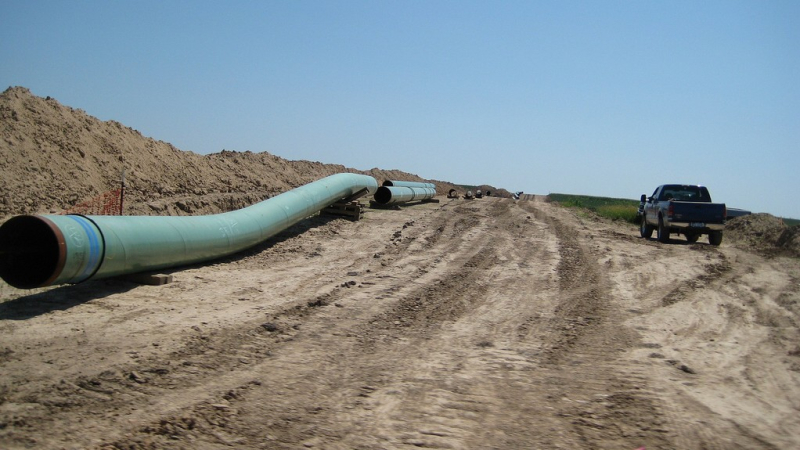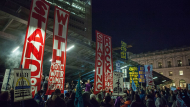Barclays’ energy policy review: ‘Half measures’ not good enough, says BankTrack

A new energy and climate change statement from Barclays, described by the bank as “supporting the transition to a low carbon economy, while also ensuring that global energy needs continue to be met responsibly,” is shot through with ‘half measures’, according to BankTrack. [1]
Greig Aitken, Coal campaigner at BankTrack, said:
“Despite Barclays’ claims, the new policy measures lack the necessary ambition to adequately contribute to combating climate change or to safeguard the health and rights of communities around the world directly affected by fossil fuel projects. These are disappointing half measures when the worsening climate crisis now demands that banks end their financial support for fossil fuels completely.”
BankTrack’s assessment of the measures introduced by Barclays, to cover its “necessary financing” going forward for carbon intensive and high impact sources of energy, finds the bank failing most starkly on its approach towards financing for tar sands.
Barclays has committed to introducing ‘enhanced due diligence’ for clients and transactions in both the tar sands and Arctic oil sectors. Yet while 13 European banks now have some form of exclusion or restriction on financing for tar sands projects, [2] and 11 European banks have done the same for Arctic oil and/or gas projects, [3] Barclays’ new statement contains no form of exclusion or restriction on financing to these sectors.
Barclays has provided regular financing in recent years to TransCanada, the company behind the controversial Keystone XL tar sands pipeline, and its overall financing to tar sands companies rose in 2017 to $1.84 billion, making it the largest private sector bank supporter of tar sands outside north America. [4]
Claire Hamlett, Climate campaigner at BankTrack, said:
“Barclays lags behind even the partial policies of its British peers on tar sands. For example, HSBC, Standard Chartered and RBS have all at least excluded project finance for some tar sands projects.
“But the big money supporting tar sands expansion is coming in the form of corporate finance. By lending to companies like TransCanada, Barclays is supporting massive fossil fuel expansion projects that the climate cannot afford and that Indigenous communities do not want. These new policy measures will do nothing for the transition to a low carbon economy and clearly do not represent a responsible, sustainable approach, as the bank is claiming.”
More positively, Barclays’ new energy and climate change statement sees the bank committing to no longer provide project finance for coal mining and coal power globally. These policy changes make Barclays the twenty-second major international bank to commit to ending project finance for new thermal coal mines, and the twentieth to do the same for new coal plants worldwide. [5]
The new statement, however, places no definitive restrictions on Barclays continuing to “provide general corporate financing for current corporate clients that own and operate existing thermal coal mines and coal-fired power stations.”
Greig Aitken, Coal campaigner at BankTrack, said:
“Three years on from the ink on the Paris Agreement drying, it is good to see Barclays take a meaningful step forward by ending its direct finance for coal mining and coal power projects globally. In terms of responsible climate action, this move takes it beyond HSBC, which is regrettably still open to financing coal power projects in Bangladesh, Indonesia and Vietnam.
“However, these new policy prescriptions on coal financing do not address the reason Barclays last year became Europe’s third biggest private sector bank supporter of companies planning coal power expansion around the world. Our recently published research shows that this was driven by Barclays’ issuing of bonds via underwriting for these companies. In 2018, the beneficiaries of Barclays’ underwriting services included Adani, National Thermal Power Company of India and RWE, companies which are involved in destructive, highly controversial coal development activities in Australia, Bangladesh and Germany.
“At a time when no finance should be going to new fossil fuels, as demanded by the ‘Fossil Banks, No Thanks!’ campaign, it’s alarming that Barclays remains a heavy supporter of new coal development via its underwriting business. It has taken three years for Barclays to make a meaningful policy move on coal. Campaigners will be upping the pressure to get Barclays out of coal quickly and for good.”
Research published by BankTrack and partner organisations in December shows that while Barclays’ lending for the top 120 coal plant developer companies has been in sharp decline over the last three years, its mobilisation of capital for these companies via underwriting services has more than doubled since 2016 to $1.32 billion for the first nine months of 2018. [6]
For more information, contact:
Greig Aitken, BankTrack, Tel: +420 607084093; Email: greig@banktrack.org
Notes for editors:
1. Barclays’ new energy and climate change statement is available at: https://home.barclays/statements/barclays-energy-and-climate-change-statement/. See also the bank’s announcement tweet.
2. See BankTrack’s overview of banks which have introduced policies on tar sands .
3. See BankTrack’s overview of banks which have introduced policies on Arctic drilling.
4. Data on Barclays’ financing for tar sands (and other fossil fuel sectors) is available in the Fossil Fuel Finance Report Card 2018: https://www.ran.org/wp-content/uploads/2018/03/Banking_on_Climate_Change_2018_final.pdf
5. See BankTrack’s lists of banks which have ended direct finance for new coal mines and coal plants worldwide.
6. See the financial data showing the banking sector’s support for the top 120 coal plant developer companies, as released in December 2018. The research found that Barclays’ lending volumes – covering corporate loans, revolving credit facilities and project finance – to coal plant developer companies were $902 million in 2016, $229 million in 2017 and $35 million in the first nine months of 2018.


